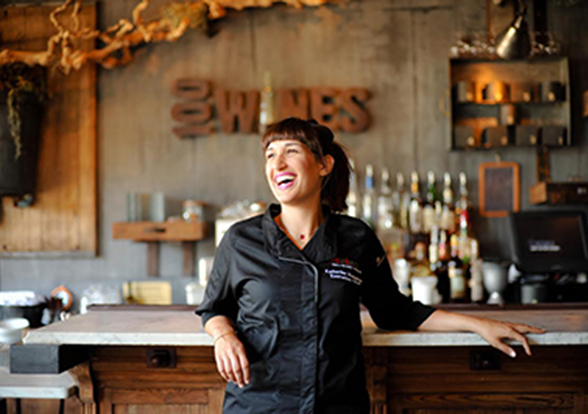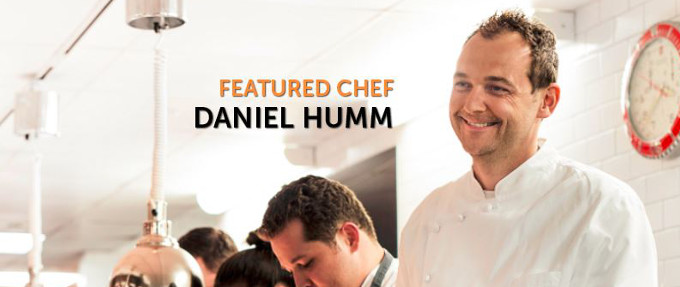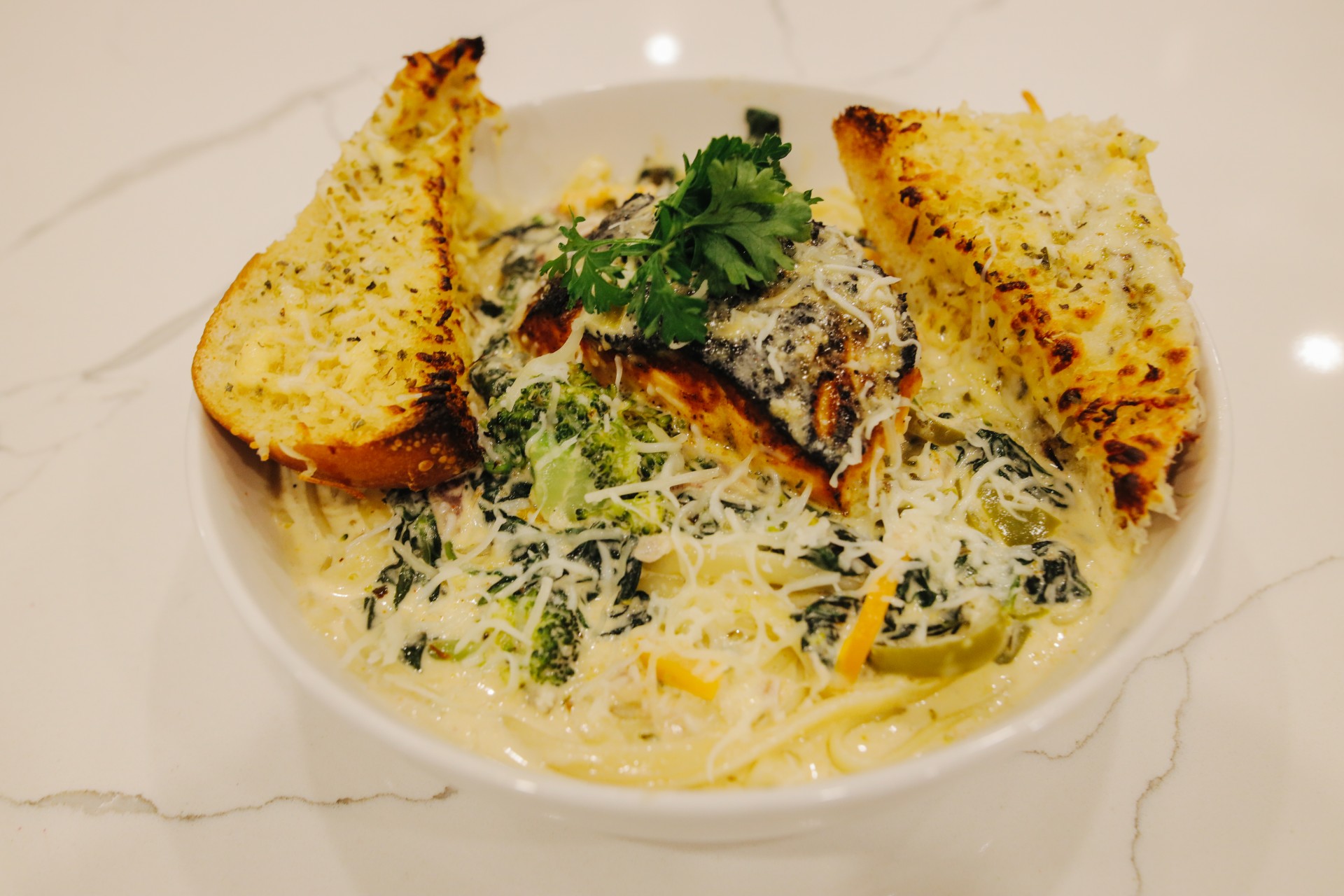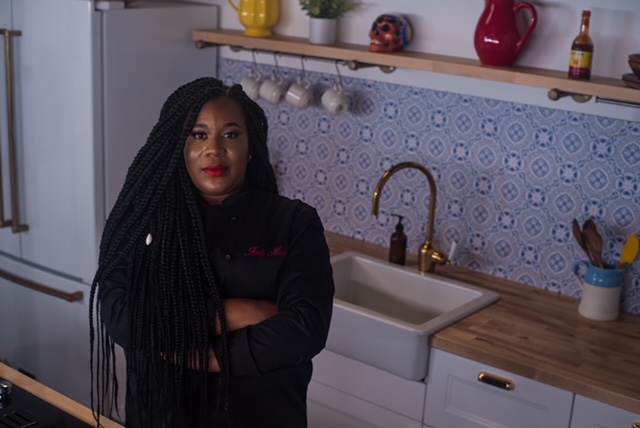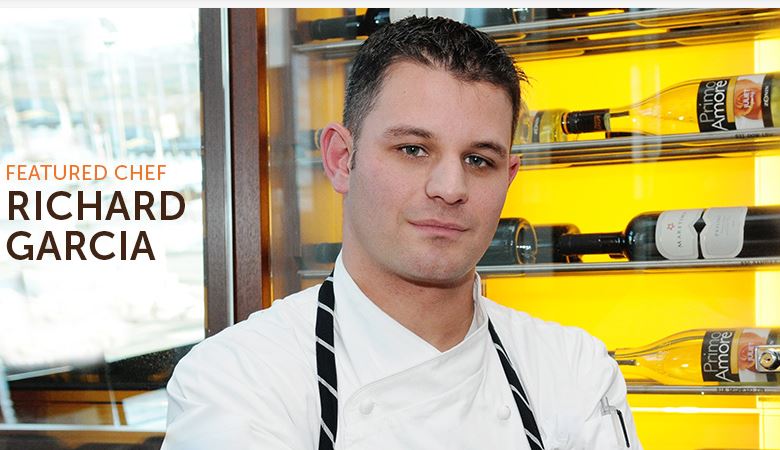
Location: Massachusetts, USA
Current job(s): Sodexo North America, Sports & Leisure
Position: National Director of Culinary
Years in the industry: 20 years
Notable awards: Starchefs.com Boston Rising Star Chef Award, invited to cook at James Beard House
Everyone has a story. Tell us how you knew you wanted to become a chef?
I knew I wanted to work in an environment that was honest, creative and a little out of the norm. My father traveled a lot and when I had the opportunity to travel with him we obviously ate out a lot, mostly in inner city ethnic restaurants as that’s where my father conducted most of his business. Something about the authentic dining experience as a child resonated with me as I got older. It also helped that both my mother and my grandmother cooked constantly at home. Dinner was the only time we could really ever be a family, again the dining experience was more than just food and I wanted to provide that experience to my guests. There came a time when I realized that despite my aspiration to be as good as my culinary heroes, I probably wasn’t, so I chose a different path and focused on my role as a leader and innovator in the food service industry, using high-end independent restaurant philosophy to elevate the dining experience for my guests.
What is your inspiration and motivation in your day-to-day routine?
I have a few that really help me through each day… First and foremost, the opportunity to teach and mentor and watch your young (or older) cooks and chefs grow to be successful chefs is by far my biggest motivation. The second, is knowing I am also a good business man, I understand that at the end of the day, the decisions we make are impacting the success of a company. The ability to provide unmatched dining experiences and still make money is exciting to me, it’s a challenge every day and I enjoy it. The last is innovation, I love being in a position to help influence innovation across the country in my role.

You are the National Culinary Director for Sodexo North America, Sports and Leisure Division, what does this position mean?
Well…. It means I travel A LOT! As far as my day to day role, I am responsible for the corporate level culinary oversight, strategy and development as well as the successful operations of all food and beverage processes in the leisure divisions’ restaurants, cafes, casinos, conferencing and banquet operations. I also help guide the development of the divisions’ leaders and 1000+ employees to ensure uncompromising quality in culinary execution, guest experience and improved financial performance. The last hat I wear is as a member of the leisure divisions’ sales efforts to support growth and develop new business within our leisure portfolio.
What is the most difficult part of your day as a chef?
For me the most difficult part is allowing the newer cooks to make mistakes and learn from them, when you only have one shot to make a guests dining experience amazing, and you see something going wrong, knowing when to step in is critical to both the development of the cook and the satisfaction of our guests. Sometimes I just want to jump on the line and do it all myself.
What is most rewarding about your position?
I have a very unique opportunity to travel the country every week to a different city and work with some amazing chefs, collaborate on menus from casual to fine dining and most importantly get to cook in their kitchens with them. I have been blessed with a position that allows me to see and taste some of the highest quality products from across the entire country and learn about how they were made, where they were produced, where they were grown and how they were caught. My understanding of regional cuisines is more than I ever imagined it would be.
What is your leadership philosophy?
My leadership philosophy as it relates to cooking is to be patient and really make sure that my cooks understand that food should be an experience for everyone to be able to enjoy. You don’t need to cook foie gras and lobster every night to be considered a great cook, in fact it’s pretty easy to cook with luxurious ingredients… it’s much harder to teach a cook how to work with underutilized fish species like scup or sea robin, teach them how to make even the toughest cuts of meat and scraps a winning dish and work with fruit and produce that isn’t processed and ready to cook, then also teach them what to do with the potential waste, to me that’s really cooking. I want my cooks to understand that whether they are cooking a meal for $100 a plate or cooking a $8 dollar sandwich, the person on the receiving end of that food should feel that that was the best thing they have eaten that day. If my cooks puts that much heart and soul into every dish they make, they then understand the honesty of what we can do in a kitchen and win over guests day in and day out.
What is your most unusual source of inspiration for cooking?
Fishermen’s “Trash Fish” is by far one of my favorite ( and unusual) inspirations. I hosted one of the very first trash fish dinners in the country using what most fishermen would consider to be by catch or “trash fish”. Today several organizations have jumped on the coat tails of our first attempt at making these lesser known species of fish an alternative to those species that are in need of recovery. You see trash fish dinners all over the country today.
In your opinion, name the world’s best places to learn and experience the Culinary scene.
In my opinion, its anywhere you don’t feel comfortable. Whether that be another region of the country you’ve never been to, or another country all together, eating and experiencing food and ingredients your not familiar with is by far the best place to learn and experience the culinary scene. I also think that experience different levels of cuisine in your own backyard is a great way to learn, if you’re not eating at the fanciest restaurant and then the cheapest restaurants and street foods and everything in between, you will never understand why those exist.
What is your most memorable meal or food related memory?
I had just been invited to cook at the James Beard House in NYC. It was one of the most complicated menus I had ever put together and my vision of fine dining was just that, complicated. The day after my wife surprised me with lunch at Chef Eric Riperts, Le Bernardin. The entire meal was spectacular, but the one dish that to this day forever changed my food philosophy and shaped the way I teach today was made with 4 ingredients. Grilled Kingfish, roasted morel mushrooms and a pea and wasabi puree. That’s it… everything was of the freshest and highest quality, seasoned and cooked to perfection. It taught me to respect the quality of the ingredients, don’t alter what natural beauty the ingredients already have, learn to season perfectly and then cook everything with the utmost care and precision… I can taste the dish as I write this.

What was the biggest ”break” in your career? Can you share what you did that set you apart from your competition and how you prepared for the opportunity?
I would say my biggest break came from Starchefs.com in 2009 when I was selected to do a tasting for the editor in chief. We were one of the only small restaurants located outside of the Boston City limits. I’ll be 100% honest. We didn’t prepare much, we did what we did. And I still to this day think that because we didn’t try to do something just to impress, I won the Boston Rising Star Chef Award. Cooking honest food, sourced local high quality ingredients even before it was “cool” to source locally and put together an amazing team that without them, I would have never won. That accolade helped put me on the culinary map so to speak and I credit that award for helping me get in front of many more people.
Name your top 3 favorite food cities:
Boston, MA; Miami, FL; San Francisco, CA
What do you look for in potential team members? Where do you go to recruit?
The drive and determination to put the work in day in and day out. No ego, just a sense of team. Most of the successful recruiting is done through word of mouth.
If you could change 1 thing about the food industry, what would it be?
The mind of a culinary school grad… just because you have that piece of paper, doesn’t make you a chef, put the work in and earn it.
Do you follow food trends? If yes, name those you would keep and those you would dump.
I follow certain trends, especially those I believe in from a food philosophy standpoint. I also try and follow those trends that I believe will last past the trendy stage. Using by catch and underutilized fish species is a trend I will forever keep in my kitchens. I could do without the kale trend…..
What is on your kitchen tool / machinery wish list?
Well this is more for me than the kitchen… but many chefs are coffee junkies… I want Top Brewer to Brew four cups of coffee in one minute out of a stainless steel faucet with just a few taps on my iPhone. The TopBrewer is a high-tech coffee brewing station that makes use of Bluetooth and iOS devices to make and keep track of what’s brewing.
What are your pet peeves in the kitchen?
Not following recipes once they have been established. One of the most important things about our industry and one of the key reasons people come back is because of consistency. When cooks deviate from the recipes that have been created it drives me nuts.
If you could give every home cook one technique, skill, or advice to create delicious meals at home what would it be?
Don’t take it so seriously. Have fun and enjoy cooking. Your cooking at home, no one is getting fired and people aren’t going to walk out of your restaurant…. People can tell when someone has cooked with heart and soul… Have fun and your food will be delicious.
Organic and sustainable food systems are on the rise. What are you doing to support the movement?
I’ve been supporting the use of sustainable food systems since the early 2000. I feel that understanding the impact of your decisions in purchasing ( and all your decisions) will help you address your current needs but also help the needs of the future food system. I try to stay on top of what is going on in the movement by talking to fellow chefs who I know live and breathe the movement. It’s the best way.
What are some local famers & purveyors in your area that you recommend?
I’m lucky I have Island Creek Oyster farm within a 5 minute drive of my house.
If you could go back in time, what would you tell yourself at the beginning of your career / a young culinarian?
I’ve always worked hard, and it took me a while to realize that I had to get out of the kitchen every once in a while. I would have told myself to find a hobby that has nothing to do with the kitchen, find creative ways to spend time with your family and enjoy any time you get to yourself…
Have you ever second-guessed your will to become a chef?
Never have… Love it.
Who were your culinary role models growing up and who are they today?
Growing up I followed Chefs Douglas Rodriguez, Paul Khan and Marc Vetri. Today I am fascinated by Chef Virgilio Martinez of restaurant Central in Lima, He is a Peruvian chef who looks at ingredients through vertical ecological monitoring. According to this alternative way of understanding the geography, land is perceived not as a horizontal plane but rather vertically, so that it takes advantage of all that the elevations are able to deliver according to the particularities of each ecological system. Its pretty damn cool…
Culinary School…Yea or nay?
Personally… nay on culinary school. Get your chops by working in the best restaurants you can get into. I would say spend your money and get a business degree or hospitality degree… combined with your skill set in the kitchen, you’ll be an unstoppable force in the industry. I wish I had done that.
What is your definition of success in our industry?
Be happy doing what you’re doing and strive to make an impact on the industry in one way or another.
Name one chef we should be on the lookout for in the future.
I’ve been lucky to have mentored numerous chefs on the rise, it’s so tough to pick just one. But just because I had the pleasure of eating at his spot recently… Tom Griffen, Sous Chef at Banyan Bar & Refuge in Boston. Mark my words, you’ll hear his name again.
How did you find Chef’s Roll and what urged you to join?
The opportunity to network within the industry is far and few between. I wanted to be part of the Chef’s Roll movement to be able to connect with chefs from every facet of the industry and share thoughts and knowledge amongst our peers.
What’s next for you?
One of the unique and exciting things about what we do…. Anything can happen at any given time, given the right circumstances.



